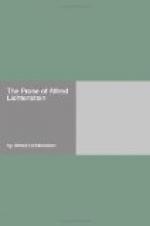The prisoners were Kuno Kohn’s good acquaintances. Not the guards; these were indeed quite friendly to him but there was an instinctive suspicion underneath. On the other hand, the ruffians and gamblers, sex killers and robbers, the most famous burglars, and most of the other distinguished old-established residents welcomed the little humpback warmly, by a slight nod of the head or almost imperceptible grin, whenever he came to watch with wide-open dreamy eyes the silent gray work. Only the fences, profiteers, confidence men, defrauders, swindlers, most of the bankrupts and some of the pimps, remained indifferent. In the course of the year, Kuno Kohn had made friends particularly with the youthful burglar Benjamin. The two often sat for hours together. If the guards looked the other way... Benjamin spoke enthusiastically to the humpback. Of sun. And freedom. And of the redemption of mankind. Kuno Kohn arranged Benjamin’s secret traffic with the outside world and did various favors for his friend; he provided him with cigarettes, books, small tools. When once a volume of Goethe and a little cigarette ash were found in Benjamin’s cell, Kohn was suspected. After the escape of the burglar, which happened shortly afterwards, which could have happened only with outside help, a message was sent to the clergyman. He forbade his son the company of the prisoners. The guards were not allowed to let him in any more.
The great problems that tormented Kuno Kohn constantly, as soon as he was able to get his thoughts together to some degree, were mainly death and God. At the age of four or five he did not believe in death, at least not in his own. And he prayed to the dear God daily before he lay down to sleep. “I am small, my heart is pure, no one shall live there but God alone”. But if he had done something during the day that seemed sinful to him—and that almost always happened—he would add (sitting in bed or standing if it was particularly bad) long and remorseful monologues until he fell asleep, overfatigued, with fingers still folded and tears in his eyes. If darkness and fear came, he always prayed. Gradually his doubts increased, to the point where he had to believe in his own death and abandon his faith in God. When he started school, there began the fullness of suffering which some children find there.




